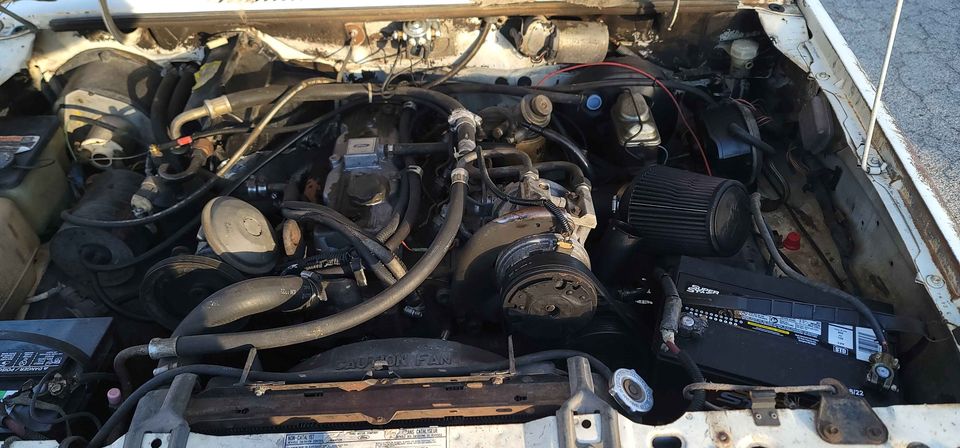How the 2.2 Ford Ranger Engine Stands Out for Durability and Power in Tough Conditions
How the 2.2 Ford Ranger Engine Stands Out for Durability and Power in Tough Conditions
Blog Article
What Makes a Cars And Truck Engine Run Efficiently: Top Tips for Ideal Care
The smooth procedure of an automobile engine is basic to both performance and longevity, making optimum treatment a crucial obligation for car owners. What details steps should you prioritize to ensure your engine continues to be in peak problem?
Routine Oil Changes
One of the most important aspects of cars and truck upkeep is ensuring your engine obtains normal oil modifications. Engine oil lubes internal elements, lowers friction, and helps preserve optimum operating temperature levels. Gradually, oil degrades because of warmth, impurities, and the natural by-products of combustion, resulting in lowered effectiveness and prospective engine damages.
A lot of suppliers recommend changing the oil every 5,000 to 7,500 miles, however this interval can vary based on driving conditions and oil type. Synthetic oils might enable for longer intervals in between adjustments. Regular oil adjustments not just improve engine efficiency but also boost fuel effectiveness, as tidy oil advertises smoother operation.
Neglecting oil modifications can result in sludge buildup, which harms blood circulation and can lead to serious engine concerns. It is vital to inspect oil degrees regularly and monitor for any kind of unusual modifications in shade or uniformity, which might show contamination or destruction.

Preserving Coolant Levels
Maintaining appropriate coolant degrees is necessary for preventing engine getting too hot and making certain optimum efficiency. The coolant, normally a mix of water and antifreeze, flows through the engine, absorbing heat and preventing thermal tension. Inadequate coolant can result in raised engine temperature levels, which might trigger serious damage or even total engine failing.
To keep optimum coolant degrees, routinely inspect the coolant storage tank, generally located in the engine bay. Make certain the coolant is loaded to the suggested mark, as suggested in your car's proprietor handbook. It is recommended to check the degrees at least as soon as a month or previously long trips, specifically during severe weather.
If you discover that the coolant degree is continually low, there may be a leakage in the cooling system, which need to be resolved promptly to protect against additional issues. 2.2 ford ranger engine. Additionally, flushing the coolant system every a couple of years can assist get rid of any kind of gathered particles and guarantee efficient warmth exchange
Monitoring Air Filters

It is recommended to examine the air filter every 12,000 to 15,000 miles, or a lot more often if driving in negative or messy conditions. A simple aesthetic inspection can frequently disclose whether the filter is dirty or damaged. If the filter appears stained or has visible dirt accumulation, it should be changed quickly.
Utilizing a top notch air filter created for your particular car model can better improve engine efficiency. In addition, some lorries may take advantage of recyclable filters that can be cleaned and reinstalled, providing a eco pleasant and cost-effective alternative.
Inspecting Glow Plugs
Glow plugs are necessary elements of a lorry's ignition system, straight influencing engine performance and efficiency. They produce the stimulate that sparks the air-fuel blend in the combustion chamber, promoting the engine's power generation. Routine evaluation of ignition system is critical for maintaining ideal engine feature and preventing possible problems.
Dark soot or oil down payments can indicate incorrect combustion, while a blistered or white look may recommend getting too hot. Both conditions need prompt interest to avoid additional engine damages.
It's a good idea to inspect spark plugs every 30,000 miles, or as advised in your car's proprietor guidebook. In addition, think about replacing them according to the maker's standards, as worn or old trigger plugs can result in misfires, minimized gas efficiency, and boosted discharges.
Monitoring Tire Pressure
Under-inflated tires can lead to lowered gas efficiency, raised tire wear, and compromised handling. Normal surveillance of tire pressure is crucial for optimum lorry operation.
Tire pressure should be inspected a minimum of as soon as a month and eventually trips. Use a trustworthy tire stress gauge to determine the stress when the tires are chilly, ideally before the lorry has been driven for at least 3 hours. Describe the vehicle's owner guidebook or the placard located on the driver's side door jamb for the supplier's suggested pressure levels.
It is essential to note that tire stress can rise and fall with modifications in temperature level; a decline of 10 ° F can cause a 1-2 psi decline in stress. Furthermore, look here aesthetically check tires for any kind of signs of wear or damages during More Bonuses your surveillance routine. Preserving proper tire stress not only improves car safety yet additionally enhances gas effectiveness and extends tire life, eventually contributing to a smoother engine performance.
Verdict
To conclude, maintaining a vehicle engine's smooth operation requires diligent focus to numerous essential elements. Routine oil changes, correct coolant levels, tidy air filters, well-kept trigger plugs, and ideal tire stress jointly add to enhanced efficiency and durability. Adhering to these maintenance practices not only improves gas performance however also promotes a more secure driving experience. Ultimately, a proactive approach to engine treatment is essential for ensuring dependability and capability in time. 2.2 ford ranger engine.
One of the most critical facets of automobile upkeep is ensuring your engine receives regular oil adjustments. Engine oil lubricates internal components, minimizes friction, and aids maintain ideal operating temperatures. Regular oil changes not only enhance engine performance however additionally boost gas efficiency, as tidy oil advertises smoother operation.
Insufficient coolant can lead to boosted engine temperatures, which may trigger serious damages or also complete engine failing.

Report this page